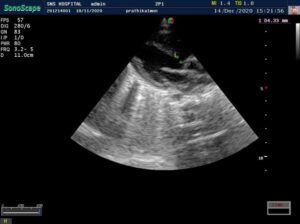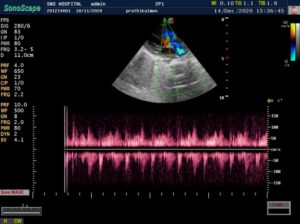Case Discussion - 1
DIAGNOSIS - GDM ON MEAL PLAN WITH FETAL CARDIAC DEFECTS
26 yrs – Primi/ Mrs. R 25/F, accountant by occupation , booked elsewhere , LMP-10/02/2020, EDD - 17/11 2020/ First visit to SNS Hospital on 07/10/2020 @ 35 weeks. Known case of GDM on Meal plan since three months of pregnancy / she was under vigilant monitoring of blood glucose , maternal wt gain, Bp, monitoring throughout the pregnancy.

The plasma Glucose levels seems apparently well under control.
Her serial growth scans showed EFW - <50th percentile.
Underwent cesarean delivery on -18/11/2020 for Dystocia of Labour, and delivered Girl – 4.00 kg. Early neonatal and postnatal period uneventful. No episodes of hypoglycemia in the baby. Maternal Blood glucose within normal limits.



CARDIAC screening of the baby was done - is fourth week of life. Showed -
> Acyanotic congenital heart disease.
VSD - 5mm - muscular non -
restrictive.
ASD - 4mm - L-R shunt
PDA - 2.5mm - L-R shunt. Baby underwent corrective surgery and is thriving well.
Points to ponder - Doctors` corner:
Even one marginally higher blood glucose - (151mg/dl - 13weeks) in the earlier trimester -though we name it as GDM - Should, arouse a suspicion of embryonic defects.
All the parameters were apparently under control throughout pregnancy, with meal plan - yet the Fetus had undergone the insult at the very earliest stage - should we redefine the terminology - GDM?
How far does the meal plan take care of the Intra uterine fetus - is Questionable.
Defining any single abnormal blood glucose values as diabetesmelitus complicating pregnancy - like what has been done in this case helps us to keep a close watch.
Asian ethnicity being a high risk for Diabetes complicating pregnancy - we see a tremendous increase in the incidence of number of pregnancies complicated with Diabetes.
Strict monitoring and control of blood glucose helps us prevent late intra uterine complications (sudden fetal death) intrapartum and early neonatal complications, not reliable is preventing embryonic insults though. Which says the pathogenesis of congenital abnormalities seen in babies born to diabetic mothers might be because of cytopathic effect of maternal immune system.




